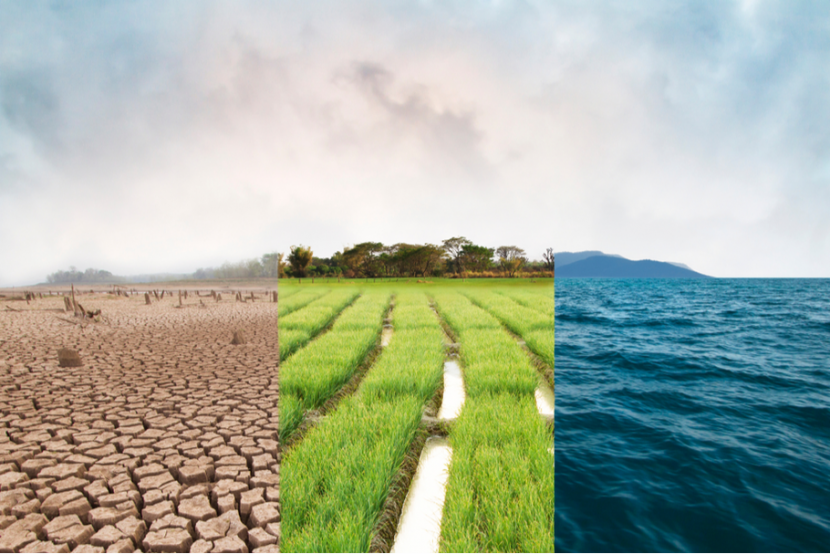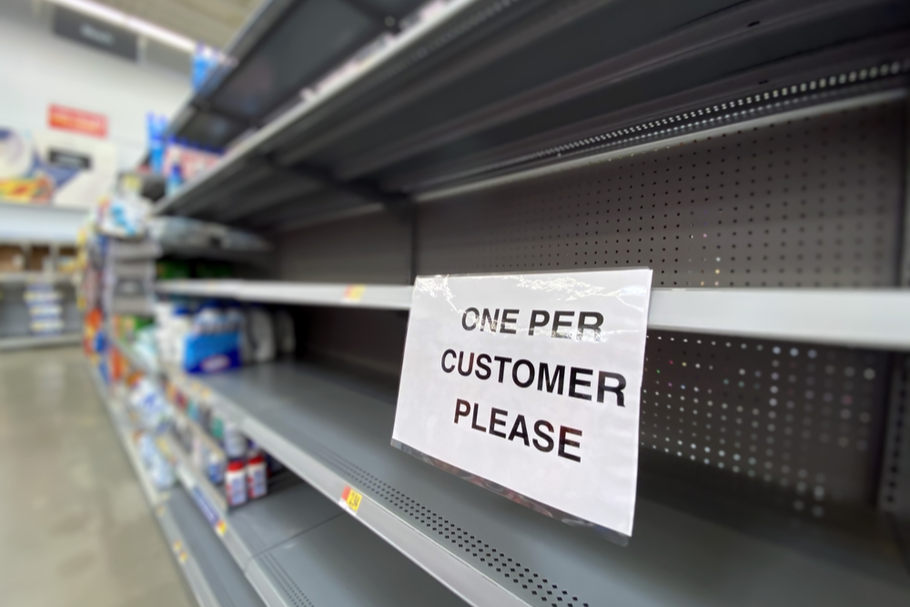Climate Issues: Drastic Change Needed to Protect Food Safety and Security
By Dr. Louise Manning
Consumers expect the food they purchase to be high-quality and safe. Assuring food security means there must be sufficient, affordable, safe food that is accessible for all. Some emerging questions are: How will climate change affect food safety? What strategies will the food sector need to adopt now and in the future to ensure food is safe to prepare and consume?
Global Implications
Predicted temperature change resulting in droughts, landslides, floods, and more will impact plants, fish, shellfish and other animals. Drought, for example, can cause a higher concentration of contaminants and pathogens in surface water. Landslides can also cause contamination of surface water, and flooding can cause contamination of soil. Arsenic can accumulate in the soil after frequent flooding. For instance, arsenic has often been found in rice in Asia. Adverse weather conditions can also lead to increased pest infestation, mould growth or bacterial growth in crop production.
A variable climate will influence the number of plant pests as well as the location and spread of zoonotic diseases.
More humid conditions increase the risk of mould or fungal contamination of cereal and grains, such as Fusarium, Aspergillus, and Penicillium and the associated toxins that are produced. Forest fires can be a potential source of airborne dioxins and polyaromatic hydrocarbons (PAH), and this precipitation can contaminate grassland, groundwater, or surface water. Forest fires can release not only PAHs and dioxins, but also sequestered cadmium and mercury, which can impact plants and soils and as a result can be ingested through the food chain.
Food for the global human population is sourced from land, surface water, and the seas. Food that is farmed in the sea or wild-caught can also be affected by climate change. Warmer oceans lead to increased methylation of mercury and the potential for increased uptake by fish and mammals, which are consumed within the human food chain. A variable climate will influence the number of plant pests as well as the location and spread of zoonotic diseases. As we are all too aware from the COVID-19 pandemic, some zoonotic diseases are transmissible to humans either person to person, via food or food handlers, or plant products.
Contamination Issues
Contamination can be microbiological (bacteria, moulds, fungi, viruses, and associated toxins and parasites), or chemical (residues from crop protection products or potential contamination from processing and packing). There is even the potential for plants to produce anti-nutrients when they are under stress from pest attacks or environmental conditions. Some studies suggest that rising atmospheric carbon dioxide levels may increase crop yields, like wheat, but will also change plant composition and reduce the nutritional quality of nitrogen, iron, sulphur, zinc, and magnesium. This could affect the essential characteristics of baked goods, such as dough elasticity. Other studies suggest a potential reduction in protein, micronutrients and some vitamins in plants, but an increase in others. This is a real concern for countries with subsistence diets where access to the nutrients in grains such as rice is critical for food security.
Anti-nutrients are naturally present in foods and can influence bio-availability of micronutrients in cereals and legumes. The level of anti-nutrients like oxalate, phytate, tannin, saponin or phenols is affected by climatic and soil conditions. There is little research to indicate how climate change will affect the level of anti-nutrients in foods in years to come. There are public health concerns associated with the impacts of climate change that need to be considered and addressed. Potentially, alternative processing methods will need to be adopted to reduce the impact of contaminants or anti-nutrients on human health.
The impact of climate change across food supply chains will be specific to the location, the foods concerned, and especially, how they react to abiotic stress factors such as water stress or high temperatures. Breeding programmes for plants and livestock will need to consider this now and in the future. Some examples of food types, potential climate change related hazards and potential risk mitigation strategies have been included in Table 1.
Table 1:
|
Food Type |
Climate Change Related Food Safety/Public Health Hazards |
Potential Risk Mitigation Strategies |
|
Shellfish and fish |
Phycotoxins from algal blooms, especially if storm events increase the amount of runoff increasing phosphorous and nitrogen in surface water. | Shellfish harvesting and purifying protocols.
Water quality monitoring to identify presence of toxins.
Implementation of prediction/forecasting models.
Increased border inspections if risk status increases.
Specific disease strategies for farmed fish with a focus on the impact of climate change.
Awareness and knowledge programmes.
|
|
Cereal grains, nuts, fruit |
Mycotoxins associated with the growth of toxigenic moulds, many of which are carcinogenic (ochratoxin A and fumonisins, [zearaleenone, deoxynivalenol and nivalenol]; aflatoxins .
|
Implementation of prediction/forecasting models to identify the risk of mycotoxin contamination.
Best practice guides for farmers, store operators and packhouses to minimize the risk of mycotoxin contaminated food entering the food supply chain or being processed for animal feed.
Breeding of plant cultivars with higher tolerance.
Effective fungicidal treatments.
Implementing surveillance programmes at border inspection points and within the supply chain. |
|
Cereals, grains, fruit, meat, seafood |
Polyaromatic hydrocarbons (PAHs) associated with forest fires. | Implementation of prediction/forecasting models for forest fires identifying potential land and water systems that are at risk.
Implementation of surveillance programmes to determine potential risk to food systems and interventions that are required.
|
|
Irrigated crops |
Contamination of surface water with phosphorous, nitrogen, pesticides, and pathogens as a result of landslides, storms, heavy rain or concentration of these contaminants during drought. | Implementation of prediction/forecasting models for storm events, flooding etc. to identify potential land and water systems that are at risk.
Implementation of surveillance programmes to determine potential risk to food systems and interventions that are required.
|
About the Author:
Dr. Louise Manning is Professor of Agri-Food and Supply Chain Security at the Royal Agricultural University, UK. With over 30 years of experience in both industry and research, Professor Manning is internationally-renowned for her work on food safety and quality, food integrity and food crime. She is an Associate Editor for the British Food Journal and is a member of the Board of Trustees for Rothamsted Research.

-
 FeaturedRisk management
The Cost of a Breach: What a Cyberattack Could Mean for Food Safety Recalls
FeaturedRisk management
The Cost of a Breach: What a Cyberattack Could Mean for Food Safety Recalls
-
 FeaturedRisk management
Securing the Food Chain: How ISO/IEC 27001 Strengthens Cybersecurity
FeaturedRisk management
Securing the Food Chain: How ISO/IEC 27001 Strengthens Cybersecurity
-
 FeaturedRisk management
Revolutionizing Food Safety Training: Breaking Out of the “Check-the-Box” Mentality
FeaturedRisk management
Revolutionizing Food Safety Training: Breaking Out of the “Check-the-Box” Mentality
-
 GFSI Standards
GFSI 2025: Building Trust, Tech-Forward Solutions, and Global Unity in Food Safety
GFSI Standards
GFSI 2025: Building Trust, Tech-Forward Solutions, and Global Unity in Food Safety
-
 FeaturedFood Safety
Integrated Pest Management: Strategies to Protect Your Brand’s Reputation
FeaturedFood Safety
Integrated Pest Management: Strategies to Protect Your Brand’s Reputation
-
 FeaturedFood Safety Culture & Training
No Open Door Policy: Challenges That Impact Pest Control in Food Processing Plants
FeaturedFood Safety Culture & Training
No Open Door Policy: Challenges That Impact Pest Control in Food Processing Plants




